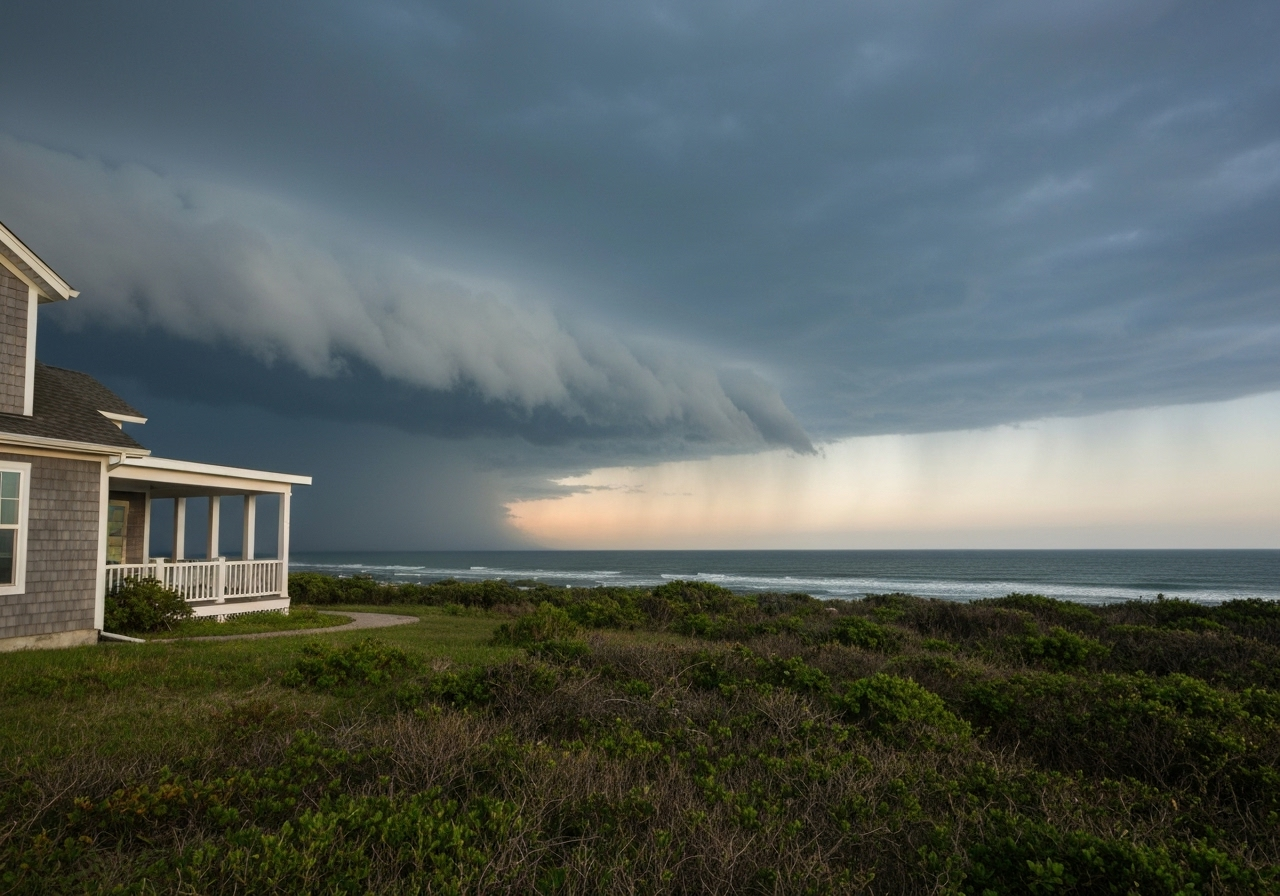Understanding Your Home’s Hurricane Deductible
As a homeowner in a coastal region, understanding your insurance policy’s intricacies is paramount, especially concerning natural disasters. One critical component often misunderstood is the hurricane deductible. Unlike your standard homeowners insurance deductible, which is typically a fixed dollar amount for most perils like fire or theft, a hurricane deductible is a separate, often higher, out-of-pocket expense specifically applied to damages caused by a hurricane or named storm. This means you’ll pay a predetermined amount – frequently a percentage of your home’s insured value – before your insurance coverage begins to pay for repairs.
Navigating these specialized deductibles can be complex, but knowing how they work is essential for financial preparedness. At Beach Insurance LLC, we believe in empowering homeowners with the knowledge to protect their most valuable asset.
What Defines a Hurricane Deductible?
The term “hurricane deductible” often gets used interchangeably with “named storm deductible” or “windstorm deductible,” but there are subtle yet important distinctions:
- Hurricane Deductible: This deductible applies specifically to damage caused by a storm officially designated as a hurricane by the National Weather Service (NWS) or the U.S. National Hurricane Center (NHC).
- Named Storm Deductible: Broader in scope, this deductible covers damage from any weather event categorized and named by the NWS or NHC, which includes hurricanes, typhoons, tropical storms, and tropical cyclones.
- Windstorm or Wind/Hail Deductible: This is the broadest category, applying to damage from any wind or hail event. However, if your policy includes a specific hurricane or named storm deductible, that one typically takes precedence when a named storm is the cause of the damage.
It’s crucial to review your policy’s declarations page to understand which type of deductible applies to your home and under what circumstances. For more in-depth information, the National Association of Insurance Commissioners (NAIC) offers valuable consumer insights on named storm deductibles.
Why Specific Deductibles for Hurricanes Exist
The implementation of specific hurricane deductibles is a relatively modern development in the insurance industry, largely spurred by catastrophic losses from major storms. Following Hurricane Andrew in 1992, which caused an estimated $25 billion in damages, insurers began to realize their significant exposure to large-scale natural disaster claims. The devastation caused by Hurricane Katrina in 2005, with over $43 billion in insured losses, further underscored this vulnerability.
To manage this immense financial risk and help keep insurance coverage available and affordable in hurricane-prone regions, insurance companies, often at the urging of reinsurers (insurers for insurance companies), introduced these specialized deductibles. By shifting a larger portion of the initial loss onto policyholders, insurers can mitigate their potential payouts, which in turn helps stabilize premiums for everyone. This mechanism ensures that the financial burden of large-scale hurricane events is more equitably shared, helping the insurance market remain viable in high-risk areas.
Calculating Your Hurricane Deductible and Trigger Events
Understanding how your hurricane deductible is calculated is vital for financial planning. Unlike a fixed dollar deductible, hurricane deductibles are typically calculated as a percentage of your home’s dwelling coverage limit – the amount your home is insured for, not the amount of the damage. Common percentages range from 1% to 5%, but can be as high as 10% or even 15% in very high-risk coastal zones.
Here’s a simple example:
- If your home has $300,000 in dwelling coverage and a 5% hurricane deductible, you would be responsible for the first $15,000 ($300,000 x 0.05) of hurricane-related damage before your insurer pays.
It’s important to note that some states, like Florida, may also offer a flat dollar deductible option, such as $500, though this often comes with a higher premium. Knowing this figure is critical for budgeting for potential storm-related expenses.
The “trigger event” determines when your hurricane deductible comes into play. These triggers vary by state and even by individual insurance policy, but often involve:
- The National Weather Service (NWS) or National Hurricane Center (NHC) issuing a hurricane watch or warning for your area.
- A named storm reaching a specific wind speed (e.g., 74 mph, designating it as a hurricane).
- A hurricane making landfall within a certain proximity to your property.
Additionally, policies specify how often you might have to pay this deductible. Some policies apply it per event, meaning you could pay it for each hurricane that impacts your home. Others, like in Florida, mandate that you only pay the hurricane deductible once per calendar year, regardless of how many named storms hit, unless you switch insurance providers within that year. Always verify these details in your policy documents or with your agent.
States Where Hurricane Deductibles Apply
While not every state uses specialized hurricane deductibles, they are prevalent in areas frequently impacted by tropical storms and hurricanes. Currently, 19 states and the District of Columbia mandate or allow insurance companies to include some form of hurricane or named storm deductible in homeowners policies. These states are:
| State | State | State |
|---|---|---|
| Alabama | Connecticut | Delaware |
| Florida | Georgia | Hawaii |
| Louisiana | Maine | Maryland |
| Massachusetts | Mississippi | New Jersey |
| New York | North Carolina | Pennsylvania |
| Rhode Island | South Carolina | Texas |
| Virginia |
Each of these states has its own specific regulations regarding when the deductible is triggered, how it’s calculated, and any exceptions or mandatory offerings (like the $500 option in Florida). For detailed information specific to your state, consulting your state’s Department of Insurance or an experienced local agent is highly recommended.
Preparing Your Finances for Hurricane Season
Beyond understanding the nuances of your hurricane deductible, proactive financial preparation is a cornerstone of effective hurricane preparedness. Hurricanes can cause significant damage, and even with insurance, you’ll need to cover your deductible and any potential costs for immediate repairs or living expenses if your home becomes uninhabitable.
Here are key steps to financially prepare:
- Build an Emergency Fund: Ensure you have readily accessible savings to cover your hurricane deductible. Knowing this amount in advance will help you set a realistic savings goal. Many financial experts recommend at least three to six months of living expenses in an emergency fund.
- Understand Flood Insurance: Standard homeowners insurance policies explicitly exclude flood damage. This includes storm surge, heavy rainfall leading to overflowing rivers, or any water that enters your home from the ground up. If you live in a flood-prone area, or even a moderate-risk zone, a separate flood insurance policy – typically through the National Flood Insurance Program (NFIP) or a private insurer – is essential. There’s often a 30-day waiting period for flood insurance to take effect, so don’t wait until a storm is imminent.
- Document Your Property: Before a storm hits, create a detailed home inventory of your belongings, including photos or videos. This will significantly expedite any claims process. Store these documents in a safe, waterproof location, or digitally in the cloud.
- Review Mitigation Discounts: Many states offer incentives or require insurers to provide discounts for homes with hurricane-resistant features, such as storm shutters, reinforced roofs, or impact-resistant windows. Implementing these measures not only reduces potential damage but can also lower your premiums.
- Stay Informed: Monitor weather reports and official alerts. The Federal Trade Commission (FTC) provides valuable consumer alerts and tips for financial organization during hurricane season.
Reviewing Your Home Policy with Beach Insurance LLC
Understanding your insurance coverage, especially when it comes to specific clauses like the hurricane deductible, is crucial for your peace of mind and financial security. Policies can be complex, and their terms and triggers vary significantly depending on your location and insurer. It’s easy to overlook critical details until a disaster strikes.
At Beach Insurance LLC, we specialize in helping homeowners in coastal areas navigate the complexities of their policies. We can assist you in:
- Clarifying Deductibles: We’ll help you understand how your hurricane, named storm, and windstorm deductibles work, including their calculation methods and trigger events.
- Assessing Coverage Gaps: We’ll review your current policy to identify any potential gaps in coverage, particularly concerning flood and wind damage, ensuring you’re comprehensively protected.
- Exploring Mitigation Options: We can discuss how home improvements to strengthen your property against hurricanes might qualify you for premium discounts.
- Preparing for Claims: While we hope you never need to file a claim, we can provide guidance on what to expect and how to streamline the process should a storm impact your home.
Being prepared means more than just boarding up windows; it means having a clear understanding of your financial responsibilities and protections when a hurricane threatens. By taking the time to review your home insurance policy, you can ensure you’re ready for whatever Mother Nature brings.
Visit our Contact Us page.






